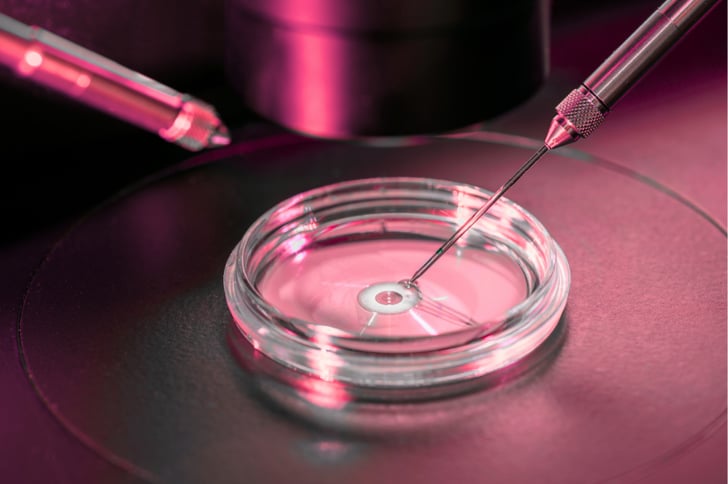Your Complete Guide to IVF: How It Works, Who It's For, and What to Expect
Discover how In Vitro Fertilization (IVF) can help individuals and couples overcome infertility and take meaningful steps toward growing their family. This blog breaks down the IVF process, who it’s for, how long it takes, and what to expect—delivered with the compassion and expertise of the Garden OB/GYN care team. A mammogram is one of the most important tools for early breast cancer detection — but many still have questions about when and why to get one. In this post, we break down what a mammogram is, who should get screened, and how it plays a key role in protecting your long-term health. Whether it’s your first time or you're due for a follow-up, this guide will help you feel more informed and confident.

Infertility can be one of the most emotionally complex and deeply personal challenges someone may face in their journey toward parenthood. But with the advancement of reproductive technology, hope is more accessible than ever before. One of the most trusted and effective options available today is In Vitro Fertilization (IVF).
At Garden OB/GYN, we are proud to support patients in NYC, Queens, and Long Island through this life-changing process. Whether you're just beginning to explore fertility treatments or you’ve tried other paths with no success, IVF may be the breakthrough you’ve been waiting for.
What Is IVF?
IVF, or In Vitro Fertilization, is an advanced fertility treatment that helps people become pregnant by fertilizing an egg with sperm outside of the body—in a laboratory. Once the fertilized egg (now called an embryo) has had a few days to develop, it is then transferred into the uterus where it can implant and grow into a healthy pregnancy.
This treatment is often used for couples who have been struggling with infertility, LGBTQ+ families looking to grow, women who want to preserve their fertility, and even for genetic screening purposes.
IVF is not just a medical procedure—it’s a tailored journey that combines science, timing, and human care. From hormone treatments to egg retrieval and embryo transfer, each step is thoughtfully planned and guided by your medical team.
What’s Involved in the IVF Process?
The IVF process includes several stages, each with its own timing, preparation, and support:
- Ovarian Stimulation: You’ll begin by taking fertility medications to stimulate your ovaries to produce multiple mature eggs. During this time, your hormone levels and follicle development will be closely monitored with ultrasounds and blood tests.
- Egg Retrieval: Once your follicles are ready, the eggs are collected during a short outpatient procedure. This is done under sedation, and most patients return home the same day.
- Fertilization: In the lab, your eggs are combined with sperm (either from a partner or a donor). This process may involve ICSI (intracytoplasmic sperm injection) if sperm quality is a concern.
- Embryo Culture: The fertilized eggs are cultured for several days. Embryologists monitor embryo development, and in some cases, preimplantation genetic testing (PGT) may be performed.
- Embryo Transfer: The healthiest embryo is transferred into your uterus using a thin catheter. The procedure is quick and typically pain-free.
- Pregnancy Test: About 10–14 days after your embryo transfer, you’ll return for a blood test to determine if the transfer was successful.
How Long Does the IVF Process Take?
On average, a single IVF cycle—from the start of medications to pregnancy test—takes about 4 to 6 weeks. However, this can vary depending on your individual circumstances. Some people may require more than one cycle to achieve a successful pregnancy, and additional time may be needed for frozen embryo transfers or further testing.
It’s important to remember: IVF is a journey, not a race. Your care team will work with you to create a plan that prioritizes both your health and your long-term goals.
Who Is IVF For?
IVF can be a life-changing option for:
- Women over 35 who have reduced ovarian reserve
- Couples facing male factor infertility (low sperm count or motility)
- People with blocked or damaged fallopian tubes
- Those with endometriosis or ovulation disorders
- Patients who have tried other fertility treatments without success
- Individuals seeking to prevent genetic disorders with PGT
- Same-sex couples or single parents by choice
Even if you’re not actively trying to get pregnant now, IVF can be part of a fertility preservation strategy—allowing you to freeze embryos or eggs for future use.
Is IVF Right for You?
IVF is a deeply personal decision that involves emotional, physical, and financial considerations. That’s why the first step is always a conversation—with real answers, real support, and real hope.
At Garden OB/GYN, we believe in walking this journey with you—not just treating you as a patient, but supporting you as a person. Our fertility specialists bring years of experience, compassion, and cutting-edge science to help you navigate this path with confidence.
Why Choose Garden OB/GYN for IVF?
We offer:
- State-of-the-art fertility technology
- Individualized care plans
- On-site laboratory and ultrasound services
- A compassionate team that truly listens
- Transparent support with insurance, timelines, and expectations
Whether you’re ready to begin IVF or simply want to explore your fertility options, we’re here when you’re ready.
Take the First Step Toward Parenthood
You don’t have to go through this alone. Schedule your IVF consultation with Garden OB/GYN today and discover how we can support you on the road to growing your family.
































